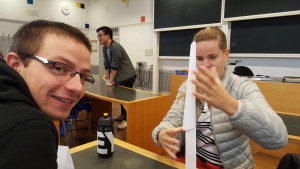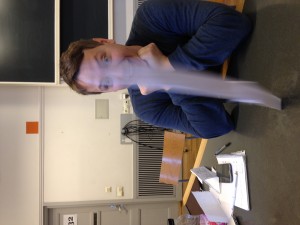I was a bit confused this Friday because I thought the lecture would focus more on the venture project. I have a hard time figuring out what it is concerning and what is expected of us. I have talked to some people in class and I have gotten similar responses and concerns. Then I started to think, maybe this is the point. Perhaps Serdar wants us to figure it out ourselves or as a group, to simulate a real life scenario of creating a startup? Because it is always hard to know what to do next when creating a startup.
Today we had a nice group work assignment during the lecture. The discussions regarding the situations which could occure when you are starting up a business were fun to do. Maybe for the next time a somewhat complexer company as an example can be usefull, because problems with a orange juice car can relative easily be solved. But nevertheless, the outcome of the discussions were good and learnfull.
After that we had to built the highest tower out of one piece of paper. That assignment was really fun, because our proces described a possible start-up perfectly. At the start we already saw that we were not going to make it with a length of two papers, because everyone was trying that. We decided to go for all or nothing, so we tried to make a tower with a length of three papers. We didn’t succeed and our tower collapsed. You also see this very often with start-ups. People try to be the very best, but just a few succeed in that and the other start-ups fail.
So today we played around in class, building towers of paper and getting to know one another. Fun fun fun!
Let me present to you my group for today’s lecture:
FREDRIK HALLBERG – An engineering doing his master in Computer Science. On his spare time he spend a lot of time doing what he’s best at, computer things. Occasionally he turn on his TV for some Netflix and chill though, really nice. And to stay in shape he has promised himself to work out for at least two times a week. In order to do so he’s started to play American Football. Go Fredrik!
CELINE LY – Doing her master in Chemical Science. Straight from Paris and Procter and Gamble she has come to join us here in Stockholm for her final semester. So glad to have you here Celine! When she’s not studying she loves to travel around the world. But that takes quite some time so mostly she just stay at home watching American series such as Revenge (girl power!) and also baking cakes. Hope she’ll bring a taste for Tuesday 😉
And the last member, me, I will leave to one of my super duper team members to present. So go visit their blogs as well!
Anyhow, as I said we also played with some paper, building towers. I think our group actually was the first with the great design (see picture) but as always, with good ideas there are people trying to copying it. Ended up with another group making a tower like 1 cm taller than ours (applause to you guys…).
Sorry for the super crappy pic but I think you all see how super tall our paper tower is. And for you who wonder what Celine looks like, that’s her right next to it.
Today we had an interesting exercise about teamwork and partners in business. By talking about what other things could happen after the startup of a company, more interestingly about worst case scenarios. This made me think further than the startup, what would happen if my company does not survive after an accident. Had very interesting conversations about this with Zbyszek and Erica.
We also built the most beautiful building by paper. In progress in the picture.
Hi,
I would like to follow up on the discussion paying more fore less functionality. Hallberg posted a discussion post on this and gave two statements I would like to comment on.
First quote: “The more you pay the more you get”
Second quote: “being prepared to pay more to actually get less”
I found both of this interesting and important to discuss when questioning what happens with NoPhone. I think there’s one thing we’re missing when concerning NoPhone as products with less functionality. I would like to separate functionality and customer value. Maybe we shouldn’t observe just the functionality of NoPhone when analyzing the product but rather speak in terms of customer value.
The customers pay for the value the product can create for them, and this is not always directly translated with functionality. Often when we talk about technology we regard more functionality as more value. This is not the situation with NoPhone. With NoPhone you pay for simplicity, not just for having fewer functions. In this case, fewer functions is directly related to simplicity but it doesn’t mean the targeted customers get less from the product.
The value of simplicity for customers like elderly overrules having fewer functions. Also, elderly may sometimes not appreciate the value of all those other functions, they just want to call their family easy. That is what NoPhone offers better than competitors.
So by this I mean that they are not per definition paying more and get less. Maybe this can clear out some questions on the subject. But then I wonder, can we see a trend in what customers value on the electronic market?
I was intrigued when watching Eric Ries video on YouTube “The Lean Startup”. I have never before heard or thought about the possibility of creating a science of entrepreneurship, and how he compered a startup to an experiment was an interesting new way of looking at it. The resemblance between this two is staggering. To me it has always been this way, when trying to create an idea or developing others ideas. So after he pointed out in the video how you can think about a startup, I have not been able to can get it of my mind.
Each time I have tried to startup a company it has been an experiment in most ways, and I have never been able to predict the outcome, even though I have head most of the information at hand. This is why I agreed that it must be smarter to be more adaptive early on in the process, because as it is for an experiment it gets harder to do “The Pivot” the further on you have come.
Someone in class mentioned early on in the course of a Ted video, “The single biggest reason why startups succeed” by Bill Gross. In this video the conclusion of Bill Gross talk is that timing is the most important aspect of a startup. Even though he had several other aspects of a startup that you would have thought would have a more significant effect of the outcome of the startup in his research, such as the idea itself.
What I find interesting with both of these videos is that they have more or less similar thoughts on how startups could be better; It does not matter if you have a brilliant team or idea, if you can not adapt to your ever changing surroundings, and use it to your advantage.
Eric Ries talk, “The Lean Startup”
https://www.youtube.com/watch?v=fEvKo90qBns
Bill Gross talk, “The single biggest reason why startups succeed”
https://www.ted.com/talks/bill_gross_the_single_biggest_reason_why_startups_succeed?language=en
http://sup46.com/
For all of you (including me) who missed the last event with SUP 46, Start-Up People of Sweden, here’s two events that they will have soon. The events seem great, attend on Facebook, would be nice to be a group from the class! 🙂
How to hack slush: https://www.facebook.com/events/416791658506068/
Happy Hours with Atomico: https://www.facebook.com/events/920414874662623/
Also, on the their webpage you can learn more about SUP 46 and what kind of startups that they have as members. http://www.sup46.com
See you!!
/Mattias
From the really interesting lecture about space tourism I am sure some of you managed to catch the mention of an extremely efficient shower. Anyways, I did and managed to find this company http://orbital-systems.com founded by a guy from Lund. The company produces amazing technology that reduces wateruse by 80% and energyuse by 90%. A very interesting entrepreneurial approach to lean from the space industry and apply in a completely different business.
Hi guys!
In the venture project we are going to write a business plan. Start-up Stockholm is having a seminar 29 sep. At the seminar they will guide you to creat an buisness plan.
If you create your own profil on the website you can read more about it
http://www.startupstockholm.se/Seminarier_Skriva_affarsplan
/Sophie


